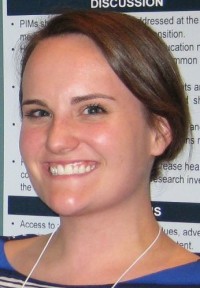The importance of proper drug disposal
VCU School of Pharmacy faculty, alumni and students have provided the Dr. Rx column for Richmond’s Fifty Plus magazine since December 2009. We now share those columns on the SOP website, as well, for those who might not have seen the most recent issue.
Serving as Dr. Rx for April 2014 was Whitney Zentgraf, a fourth-year Pharm.D. student who studied German language as an undergraduate at the university and who is interested in working with older adults to improve their medication regimens.
Dear Dr. Rx: I have all of these drugs at home that I’m not taking anymore. What should I do with them?
Sometimes we have expired or unused prescription medications in our homes. These drugs should not be tossed in the trash; rather, they should be disposed of appropriately.

Accidental ingestion of improperly disposed medications by children or pets can lead to overdose, injury or even death. Proper disposal of medications also can help prevent potential drug abuse. Approximately 60 percent of people who abuse prescription painkillers indicate that they obtained the drugs from friends or relatives for free; often, they took the drugs without permission.
People tend to think that flushing or throwing away drugs is the best way to dispose of them; however, this can contaminate the ground and waterways. Wastewater treatment plants are not designed to remove or process many compounds found in medications. When flushed down the toilet or put in a landfill, the drugs seep into our surface and ground water.
As part of the National Take-Back Initiative, Virginia hosts a Drug Take-Back Day twice a year to prevent prescription drug abuse and to keep trace drugs out of lakes and streams. Take-back programs are the safest method of disposing prescription drugs because they are organized and closely monitored by local, state and federal government agencies. These agencies ensure the safe and proper disposal of the drugs in accordance with federal law, and these free events allow you to drop off your unused, unwanted and expired medications.
The next Drug Take-Back Day takes place 10 a.m.-2 p.m. April 26 at a variety of locations in the Richmond area. Prescription and over-the-counter medications are accepted. (Intravenous solutions, injectables and needles are not.)
If you cannot participate in Drug Take-Back Day, never fear! There are still ways to properly dispose of drugs at home:
- Step 1: Remove medications from their original containers. If the medication is solid, crush it or add water to dissolve it and then mix the medication with an undesirable substance, such as kitty litter or coffee grounds. This makes the mixture unattractive to children and pets and unrecognizable to potential abusers who might go through your trash.
- Step 2: Place the mixture in a container with a lid or sealable baggie to prevent the medication from leaking, and throw it into the trash.
- Step 3: When discarding the original medication containers, scratch out or remove identifiers (your name, etc.) on the bottles and/or packaging.
If you would like to participate in Drug Take-Back Day, your nearest collection site can be located by visiting deadiversion.usdoj.gov and clicking on the “Got Drugs?” link, or by calling (800) 882-9539.
Categories Faculty and staff news, Student news
